第三章英译汉的层次--词语的翻译
合集下载
chapter 3(1) 词语的翻译
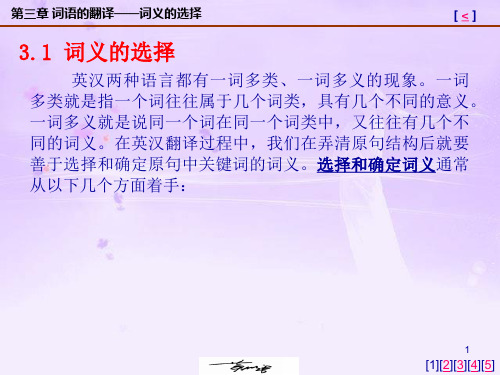
14
• “Proper words in proper place make the true definition of style.” • 合适的词用在合适的地方就是好文章。 • ——Jonathan Swift
15
• We have been working all day. We must have a break. • 我们干了一整天了,必须休息 休息一下。 休息 • Suddenly the line went limp. “I am going back.” Said Smith. “We must have a break somewhere. Wait for me. I’ll be back in five minutes.” • 引爆线突然耷拉下来。史密斯说:“我回去看 看,一定是某个地方断了线 断了线。等一下,我五分 断了线 钟就回来。”
词语的翻译——词义的选择 第三章 词语的翻译 词义的选择
[<]
3.1 词义的选择
英汉两种语言都有一词多类、一词多义的现象。一词 多类就是指一个词往往属于几个词类,具有几个不同的意义。 一词多义就是说同一个词在同一个词类中,又往往有几个不 同的词义。在英汉翻译过程中,我们在弄清原句结构后就要 善于选择和确定原句中关键词的词义。选择和确定词义 选择和确定词义通常 选择和确定词义 从以下几个方面着手:
9
[1][2][3][4][5]
词语的翻译——词义的选择 第三章 词语的翻译 词义的选择
[<]
再如“take (off)这一动词: 1) To take off her boots or to put them on was an agony to her, but it had been an agony for years. 脱鞋或穿鞋对她是一种痛苦,但这已经是多年以来的 痛苦了。 2) The flyers practiced taking off time after time from this restricted space. 飞行 人员反复地在一块有限空地上练习起飞。
第三章2++英译汉的层次(句子翻译)
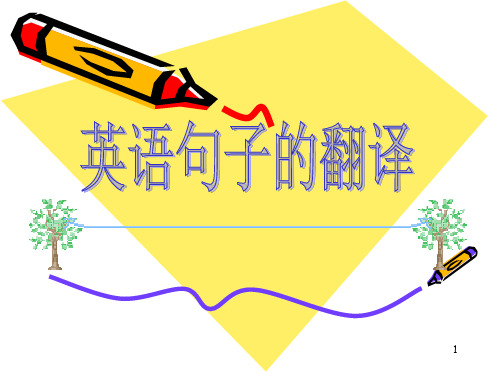
• (2)表语从句的译法 (2)表语从句的译法 • (3)宾语从句的译法 (3)宾语从句的译法
顺译法 在主句谓语动词和宾语从句间断开 处理成含“ 处理成含“的”字结构的定 语 分译法
• (4)同位语从句的译法 (4)同位语从句的译法
4
• What引导 引导 eg: 【What was once regarded as impossible】 has now become a reality. 】 过去认为不可能的事 现在已经成为现实。 现在已经成为现实。 • when引导 引导 • eg: 【 When we will begin to work】 has not been decided yet. • 什么时候 开始工作还没决定呢。 开始工作还没决定呢。
11
• There are something original, independent, and heroic about the plan that please them all. • 这个方案富于创造性,独出心裁,很有魄力, 这个方案富于创造性,独出心裁,很有魄力, • 所以使所有人都很喜欢它。(果) 所以使所有人都很喜欢它。( 。(果 • Those who are in favour please hold up their hands. • (凡)赞成的,请举手。(条件、假设 赞成的,请举手。 条件 假设) 条件、 • She was very patient towards the children, which her husband seldom was. • 她对孩子们很有耐心,而她丈夫却很少这样。(转折) 她对孩子们很有耐心,而她丈夫却很少这样。(转折) 。(转折
16
特殊状语从句
1. 2. 3. 4. Before引导 引导 Though引导 引导 Because引导efore引导 引导
第三章 词语的翻译
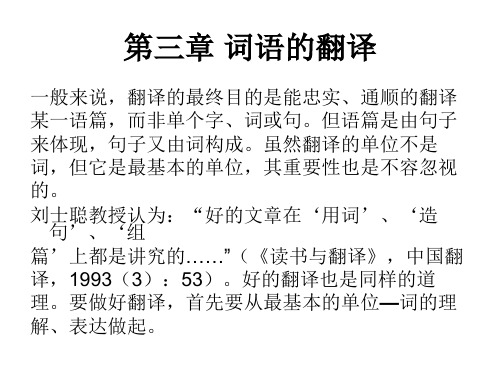
• The children are always at me to take them to the zoo. • 孩子们老是缠着我,让我带他们到动物园去。
• above • We flew above the clouds.
• He ought to be above cheating in the exam. • 他在考试中不应该作弊。 • He is a man above vulgar interests. • 他是个脱离了低级趣味的人。
身体好,学习好,工作好。 Keep fit, study well and work hard.
冻 小心别冻着。 Take care or you’ll catch cold. 别忘了把肉冻上。 Don’t forget to put the meat in the freezer. 我的手都冻了。 My hands are frostbitten. 马路上冻冰了。 There is ice on the road.
改译: 老先生:烦姑娘到对面的文具店买两张宣纸来,要上好的。 Bother you to go to the opposite stationer’s to buy two sheets of
Xuan paper of superior quality. 校长:戴蒙,有件事想请你帮忙。 Daimeng, I’ve something to ask you for help.
But his last words brought on another storm. 可是,他最后的言辞引起了激烈的反响。 Her singing took New York by storm. 她的歌声在纽约引起了轰动。
• at • His son was at Cambridge. • Let’s meet at the entrance of the station.
• above • We flew above the clouds.
• He ought to be above cheating in the exam. • 他在考试中不应该作弊。 • He is a man above vulgar interests. • 他是个脱离了低级趣味的人。
身体好,学习好,工作好。 Keep fit, study well and work hard.
冻 小心别冻着。 Take care or you’ll catch cold. 别忘了把肉冻上。 Don’t forget to put the meat in the freezer. 我的手都冻了。 My hands are frostbitten. 马路上冻冰了。 There is ice on the road.
改译: 老先生:烦姑娘到对面的文具店买两张宣纸来,要上好的。 Bother you to go to the opposite stationer’s to buy two sheets of
Xuan paper of superior quality. 校长:戴蒙,有件事想请你帮忙。 Daimeng, I’ve something to ask you for help.
But his last words brought on another storm. 可是,他最后的言辞引起了激烈的反响。 Her singing took New York by storm. 她的歌声在纽约引起了轰动。
• at • His son was at Cambridge. • Let’s meet at the entrance of the station.
翻译的层次
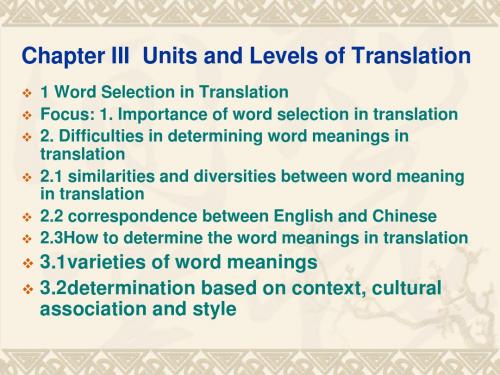
The
example shows that the meanings of an English word may enjoy great flexibility and vacillation, which lead to a lot of difficulties in word selection while we are translating English into Chinese. Translate the following sentences into Chinese and see how the meanings of the word “identity” vary with the frame of word and juxtaposed words:
1. The loan carries 3 percent interest. (生息) 2. This picture carries 300 heads of cattle. (供养) 3. How far does this gun carry? (射程) 4. The speaker carried the audience with him. (赢 得) 5. The bill was carried by the senate. (通过) 6. The pillars can’t carry the roof. (支撑) 7. This device doesn’t carry too much.. (负荷) 8. He carried the ball too fast. (带球) 9. Could you carry the bag with you? (携带) Diachronic changes: An English word may get polysemious gradually through history.
翻译层次词语层

但是由于英汉语的差异,更多情况下两种语言无法完全对应的,这时如果只是照搬词典解释就有可能出笑话。这时译者需要参考词典,结合这个词所处的语境仔细推敲,进行“语义引申”。
语义引申
引申是语言的普遍现象,词义引申指不拘泥于词的字面意义或词典提供的语义、释义,而根据上下文作必要的调整和变动。
不同的文体,引申的范围、内容、方式不尽相同。文艺作品中的引申,往往涉及作品的历史背景、社会习惯、风土人情、语气感情等; 在技术类文体中,引申的出发点是现象、事实或与主题相关的概念,引申往往从逻辑推断入手,考虑专业特点和语言习惯,符号逻辑思维的特点。
...yet, as it sometimes happens that a person departs his life, who is really deserving of the praises the stone-cutter curves over his bones; who is good Christian, a good parent, child, wife or husband; who actually does have a disconsolate family to mourn his loss;...
PART 1
(一)从语法角度来看
英语和汉语有着大致相同的词类,实词中都有名词、动词、形容词、副词、代词、数词,虚词中都有介词和连词。 两种语言中也都有象声词,所不同的是英语中有冠词,而汉语中有量词和语气词。不同的词类在句中充当不同的句子成分或起不同的语法作用。
在语内交际过程中,英汉两种语言的词类(词性)均会经常发生转换(语内转换):名词有时会变成动词,动词有时也可转作名词,如汉语中的"热爱学习(名词)"和"学习(动词)文件",英语中的 "I study(动词)"和"English study(名词)"等。
语义引申
引申是语言的普遍现象,词义引申指不拘泥于词的字面意义或词典提供的语义、释义,而根据上下文作必要的调整和变动。
不同的文体,引申的范围、内容、方式不尽相同。文艺作品中的引申,往往涉及作品的历史背景、社会习惯、风土人情、语气感情等; 在技术类文体中,引申的出发点是现象、事实或与主题相关的概念,引申往往从逻辑推断入手,考虑专业特点和语言习惯,符号逻辑思维的特点。
...yet, as it sometimes happens that a person departs his life, who is really deserving of the praises the stone-cutter curves over his bones; who is good Christian, a good parent, child, wife or husband; who actually does have a disconsolate family to mourn his loss;...
PART 1
(一)从语法角度来看
英语和汉语有着大致相同的词类,实词中都有名词、动词、形容词、副词、代词、数词,虚词中都有介词和连词。 两种语言中也都有象声词,所不同的是英语中有冠词,而汉语中有量词和语气词。不同的词类在句中充当不同的句子成分或起不同的语法作用。
在语内交际过程中,英汉两种语言的词类(词性)均会经常发生转换(语内转换):名词有时会变成动词,动词有时也可转作名词,如汉语中的"热爱学习(名词)"和"学习(动词)文件",英语中的 "I study(动词)"和"English study(名词)"等。
翻译层次--词语层1

版社
retirement 退休---退休处;幽静地方; 偏僻地方
在翻译过程中,英汉两种语言有时可无词类转换, 但更多的时候则常伴有词类转换(语际转换)
(1) He is a teacher of English. 他教英语。(名词转成动词) (2) He is physically weak. 他身体很弱。(副词转成名词) (3) She was gazing across the sea,
(一)从语法角度来看
英语和汉语有着大致相同的词类,实词中都有名词、动词、 形容词、副词、代词、数词,虚词中都有介词和连词。
两种语言中也都有象声词,所不同的是英语中有冠词,而 汉语中有量词和语气词。不同的词类在句中充当不同的句 子成分或起不同的语法作用。
在语内交际过程中,英汉两种语言的词类(词性)均会经 常发生转换(语内转换):名词有时会变成动词,动词有时 也可转作名词,如汉语中的"热爱学习(名词)"和"学习(动 词)文件",英语中的 "I study(动词)"和"English study (名词)"等。
My uncle remembered me in his letter to my father.
我叔叔在给我父亲的信中向我问好。
My uncle remembered me on my birthday.
我叔叔送了我一个生日礼物。
My uncle remembered me in his will. 我叔叔在他遗嘱中指明分给我遗产。
uncle(广义)-叔父,伯父,姑父,姨父,舅父 (狭义)
milk 奶(抽象);人奶,牛奶,羊奶(具体); film胶卷(一般),影片(个别)
retirement 退休---退休处;幽静地方; 偏僻地方
在翻译过程中,英汉两种语言有时可无词类转换, 但更多的时候则常伴有词类转换(语际转换)
(1) He is a teacher of English. 他教英语。(名词转成动词) (2) He is physically weak. 他身体很弱。(副词转成名词) (3) She was gazing across the sea,
(一)从语法角度来看
英语和汉语有着大致相同的词类,实词中都有名词、动词、 形容词、副词、代词、数词,虚词中都有介词和连词。
两种语言中也都有象声词,所不同的是英语中有冠词,而 汉语中有量词和语气词。不同的词类在句中充当不同的句 子成分或起不同的语法作用。
在语内交际过程中,英汉两种语言的词类(词性)均会经 常发生转换(语内转换):名词有时会变成动词,动词有时 也可转作名词,如汉语中的"热爱学习(名词)"和"学习(动 词)文件",英语中的 "I study(动词)"和"English study (名词)"等。
My uncle remembered me in his letter to my father.
我叔叔在给我父亲的信中向我问好。
My uncle remembered me on my birthday.
我叔叔送了我一个生日礼物。
My uncle remembered me in his will. 我叔叔在他遗嘱中指明分给我遗产。
uncle(广义)-叔父,伯父,姑父,姨父,舅父 (狭义)
milk 奶(抽象);人奶,牛奶,羊奶(具体); film胶卷(一般),影片(个别)
unit-3词语翻译PPT课件
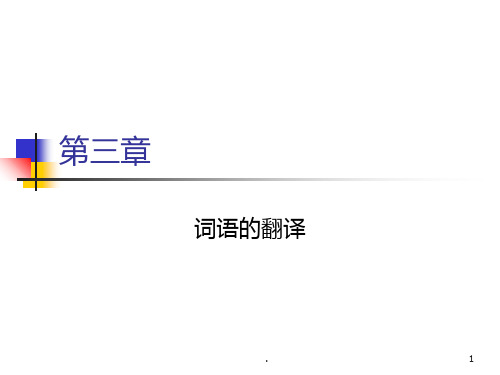
.
24
3.那位工程师在一次事故中受了重伤。
误译:The engineer got seriously wounded in an accident.
正译:The engineer got seriously injured in an accident.
评析:wound 指在战争或战斗中受了枪 弹、刀创伤。injure 指在事故中受伤。上 述二词都比hurt (受伤)严重得多。
.
18
地道表达
31.有名无实 a poor apology 她很有名气,只不过是个有名无实的歌
星。 She does have a big name, but she’s
only a poor apology for a good singer.
.
19
32.绞尽脑汁 to rack one’s brain 33.没骨气 have no guts 34.真了不起 really something 35.昙花一现 a flash in the pan
A party member should listen carefully to the opinions of the masses.
.
6
3)他们对这项计划提出了修改意见。
They made some suggestions for the revision of the plan.
4)大家对你很有意见。
?一本书abook??申请书letterofapplication??协议书?agreement?家书aletterfromhome?使用说明书?directions??成交确认书salesconfirmation情书aloveletter国书credentials议定书protocol证书certificate书报亭newsstand书画paintingandcalligraphy书房study书生intellectual参考书目bibliography????????????????????意见opinionviewsuggestion
翻译层次-词语层2

增词绝不是无中生有,随意增加原文的意 思。现从语法、语义和修辞三个方面略作 说明。
(一)语法性增词(英-汉翻译时) 为了使译文语义明确,畅达通顺,符合汉 语的习惯,翻译中常根据语法上的需要增 加动词、名词、形容词、副词、量词、范 畴词、概括词,以及表示名词复数、动词 时态等方面的词。例如:
an elephant一头大象 a pen一支钢笔 a martial music一首军乐曲 a plane一架飞机
(三)修辞性增词
修辞性增词大都出于译文行文上的考虑, 因此,修辞性增词往往出现在译者推敲、 校正和润饰译文行文的过程中,而且所增 加的词往往是不改变原文词句意思的语气 补足词、强调性副词或其他修辞上所需要 的词汇。其中,为了使译文明确、强调或 生动而重复一些关键性的词,也被视为修 辞性增词
Don’t take it seriously.It's only a joke. 不要认真嘛!这不过是开个玩笑而已。 I wouldn’t have eaten it, only I’m too ladylike to take it out of my mouth. 我本来不想吃,只是觉得再从嘴里拿出来太不雅观。 We think we have freed our slaves,but we have not.We just call them by a different name. 我们自以为奴隶已经解放了,实际上并没有。我们只不过 用一种不同的名字来称呼他们罢了。 He cried,“Good news,fellows!” 他嚷着说:“同志们,报告一个好消息!” He passes in the middle of the garden,exercising his fingers, which are slightly numbed by her greeting. 他走到园子当中,活动活动手指头,因为被她刚才一捏有 点发麻。
- 1、下载文档前请自行甄别文档内容的完整性,平台不提供额外的编辑、内容补充、找答案等附加服务。
- 2、"仅部分预览"的文档,不可在线预览部分如存在完整性等问题,可反馈申请退款(可完整预览的文档不适用该条件!)。
- 3、如文档侵犯您的权益,请联系客服反馈,我们会尽快为您处理(人工客服工作时间:9:00-18:30)。
(饮料) (软件) (柔和的光) (轻音乐) (文火) (轻声低语) (好心肠) (垒球) (纸币)
14
• He is so strong. 他很壮。 • The wine is rather strong. 这酒劲还挺大。 • The rope is strong enough. 绳子够结实的。 • The proposal only met strong objections.
我们为我们的祖国而自豪。
• He is so proud that he always look down upon all his classmates.
他十分傲慢,看不起所有同学。
23
根据词语使用的语体选择词义
• 语体:语言随着语境的不同而产生的变体,即语言的使 用者会随着语境的不同选用不同的语言表达意义。
• She said, "He is a lightly discriminating man." • 她说,“他是个有点挑剔的买主。"(一般-个别)
22
根据词义的褒贬选择词义
• Mao Zedong showed his great ambitions even when he was very young.
轻巧的设备(light=handy)
• light work
轻松的工作(light=requiring little effort)
• light voice
轻柔的声音(light= soft)
13
• soft drink • soft ware • soft light • soft music • soft fire • soft voice • soft heart • softball • soft money
10
telecommuter woopie
在自己家中借助现代电讯手段与公司或客户保持联 系,而无需去公司办公的上班族。
富有的老年消费者
plumber
五角大楼文件泄密事件后白宫设立的专门特工机
构。原义为“管子工”,用以指特工,是借用其 防
漏、堵漏的功能。现指美国调查政府雇员泄密事 件的特工。
11
• American Dream • cheesecake • beefcake • blue boy • pink lady
• 选词要符合原文的语体,符合说话人的身份。
24
• (1) Grasp all, lose all.
•
如果你样样都要抓,就会一样都抓不到。
改:样样抓,样样失。
• (2) Apply sunscreen liberally (at least one large handful ) about 30
19Leabharlann 根据词性选择词义I saw a saw saw a sea-saw in a saw-mill. 我曾在锯木厂看到一把锯子在锯跷跷板。 Communication net 通讯网(名词) Net profit 纯利,净利(形容词) The sale netted the company a fat profit. 这次买卖使公司净赚了一大笔。(动词)
26
末端; 结束
end
业务(部)
27
称呼(vocatives)由繁趋简;
a. 语体标记 遣词(diction)由正式到随意;
造句(sentence formation)由长到短; 语法(grammar)由繁复到简单。
• (1)Ladies and gentleme杰n,出w的e t;ake great pleasure in presenting for today discussion on the range of appropr闻iat名en的ess in American English two distinguished scholars in the field, first, Roger W. Shuy, the eminent sociolinguist, Director of the Sociolinguistics Program of Georgetown University……
•
这许多优质产品有现货,准备你来订货。
• 改:多种优质产品备有现货,欢迎订购。
25
• (4) “爸爸,妈妈,你们也买钱罐存钱吧。你们没钱了,罐子就会 把肚肚里的钱掏出来给你们的。”
• “Daddy, Mummy, please buy a piggie for yourselves. When you have no more money, the piggie will open its tummy and give you money.”
minutes before going outside.
•
涂抹防晒油时要大方(至少要满满一把),涂抹约30分钟后方可
外出。
• 改:应该足量使用防晒霜(至少满满一把),且在外出前30分钟使用
。
• (3) Many of these fine products are in stock, ready for your order.
• Rich and powerful, he always goosesteps on the street.
他有钱有势,在街上总是耀武扬威,横行霸道。
• He preferred the products of old brand to the new flashy. • 他宁可要老牌产品,而不要质量差的新产品。(抽象-具体)
the (flame of ) war spread tough policies
5
parent uncle sister marriage morning gun film
部分对应
父亲或母亲 叔叔,舅舅 姐、妹 娶,嫁 早晨,上午 枪,炮 胶卷(一般),影片(
个别)
6
• vinegar •醋
不高兴,坏脾气 妒忌
提议遭到强烈反对。
15
Translate:
• She wore dark glasses and a thick jersey. • 她戴着深色的墨镜,穿着一件厚毛衣。 • The girl wears the slimness of her mother. • 这女孩像她的母亲一样苗条。 • I will wear his love in my heart’s core forever. • 我将永远把他的爱深藏心底。
• light heart
轻松的心情(light=relaxed)
• light car
轻便汽车(light=having little weight)
• light step
轻快的步伐(light=gentle)
• light manners 轻浮的举止(light=frivolous)
• light outfit
太平洋 亚洲(亚细亚) 直升飞机
核武器 知识产权 中东危机 贸易伙伴
4
假完全对应
• •
sour milk eat one’s
words
变质发酸了的牛奶 承认自己说溶错解话
• 盐水
salt solution
• 方便面
instant noodles
• 课题测验
pop-quiz
• 战火扩大 • 强硬政策
指美国标榜的立国精神: 人人自由和机会均等 半裸体或露出曲线美的女人照片 男子健美照片 指经过变性手术,由男性转变成女性的人. 一种鸡尾酒
12
交叉对应
• light music 轻音乐(light=intended chiefly to entertain)
• light loss
轻微的损失(light=not heavy)
No cycling at the gate. Cyclists please dismount.
• 夜来风雨声 storm shower rain
18
词义的选择
• 根据词性选择词义 • 根据词义的抽象或具体、一般或个别选择词义 • 根据词义的褒贬选择词义 • 根据词语使用的语体选择词义 • 根据搭配关系选择词义
16
• 总的说来,中国的文化是向模糊、朦胧及总体的方向 走,而西方的文化则是向准确与具体的方向走。(杨 振宁)
17
•酒
wine beer spirit liquor glutinous rice wine
• 胡子 • 出入请下车
beaver, moustache, whiskers, beard
• (2)Welcome to today’s program, Varieties of American English ----- Stylistic Differences. Your hosts are two well-known sociolinguists, Dr. Roger Shuy of Georgetown University and the Center for Applied Linguistics, and Dr. Dennis Preston, from the State University of New York College of Fredonia.
• (3)Hello, today we’re going to hear from Roger Shuy from Washington, D. C., and Dennis Preston, from Fredonia, New York, about the language change in different times and……
8
• cricket 蟋蟀 • 昨夜寒蜇不住鸣,惊回千里梦,已三更 。
